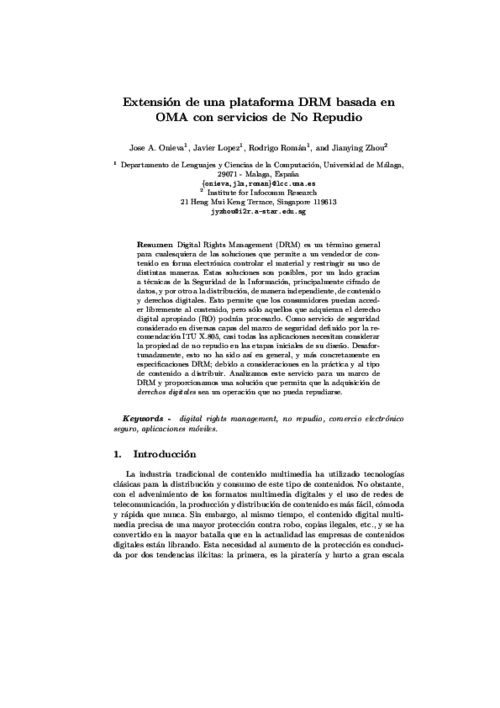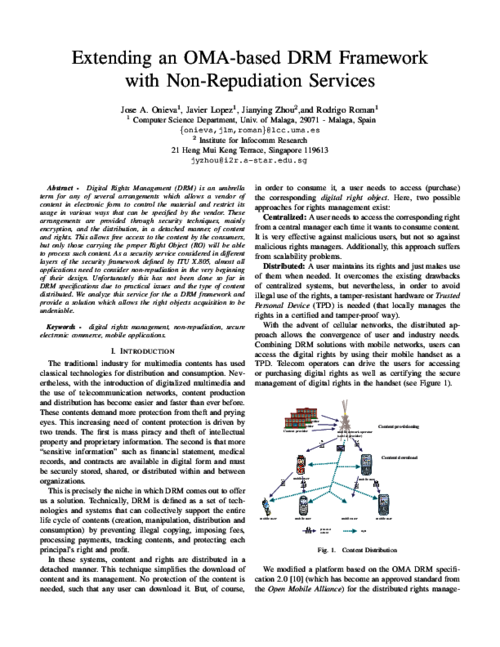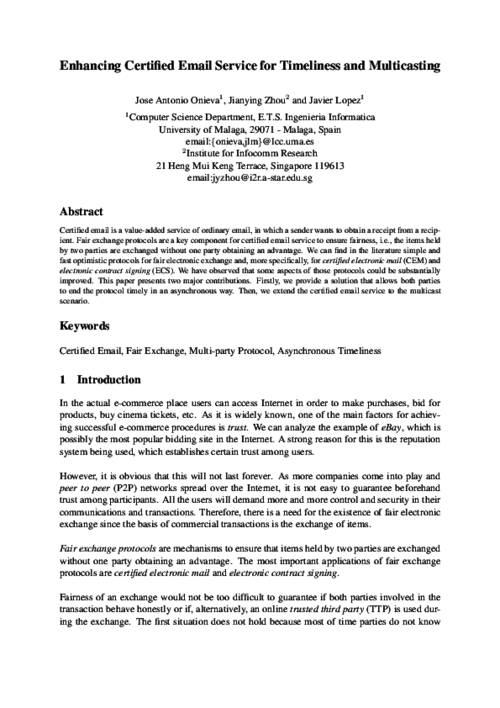IX Reunion Española sobre Criptologia y Seguridad de la Informacion (RECSI’06), UOC S.L., pp. 129-141, 2006.
Abstract
Digital Rights Management (DRM) es un término general para cualesquiera de las soluciones que permite a un vendedor de contenido en forma electrónica controlar el material y restringir su uso de distintas maneras. Estas soluciones son posibles, por un lado gracias a técnicas de la Seguridad de la Información, principalmente cifrado de datos, y por otro a la distribución, de manera independiente, de contenido y derechos digitales. Esto permite que los consumidores puedan acceder libremente al contenido, pero sólo aquellos que adquieran el derecho digital apropiado (RO) podrán procesarlo. Como servicio de seguridad considerado en diversas capas del marco de seguridad definido por la recomendación ITU X.805, casi todas las aplicaciones necesitan considerar la propiedad de no repudio en las etapas iniciales de su diseño. Desafortunadamente, esto no ha sido así en general, y más concretamente en especificaciones DRM; debido a consideraciones en la práctica y al tipo de contenido a distribuir. Analizamos este servicio para un marco de DRM y proporcionamos una solución que permita que la adquisición de derechos digitales sea un operación que no pueda repudiarse.

5th Symposium on Signal Processing and Information Technology (ISSPIT’05), IEEE, pp. 472-477, 2005.
Abstract
Digital Rights Management (DRM) is an umbrella term for any of several arrangements which allows a vendor of content in electronic form to control the material and restrict its usage in various ways that can be specified by the vendor. These arrangements are provided through security techniques, mainly encryption, and the distribution, in a detached manner, of content and rights. This allows free access to the content by the consumers, but only those carrying the proper Right Object (RO) will be able to process such content. As a security service considered in different layers of the security framework defined by ITU X.805, almost all applications need to consider non-repudiation in the very beginning of their design. Unfortunately this has not been done so far in DRM specifications due to practical issues and the type of content distributed. We analyze this service for the a DRM framework and provide a solution which allows the right objects acquisition to be undeniable.

Fourth International Network Conference, University of Plymouth, pp. 327-335, 2004.
Abstract
Certified email is a value-added service of ordinary email, in which a sender wants to obtain a receipt from a recipient. Fair exchange protocols are a key component for certified email service to ensure fairness, i.e., the items held by two parties are exchanged without one party obtaining an advantage. We can find in the literature simple and fast optimistic protocols for fair electronic exchange and, more specifically, for certified electronic mail (CEM) and electronic contract signing (ECS). We have observed that some aspects of those protocols could be substantially improved. This paper presents two major contributions. Firstly, we provide a solution that allows both parties to end the protocol timely in an asynchronous way. Then, we extend the certified email service to the multicast scenario.

 ]
]